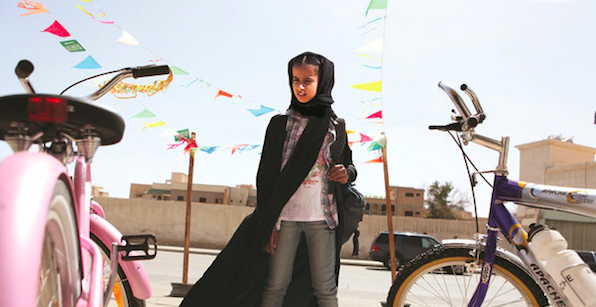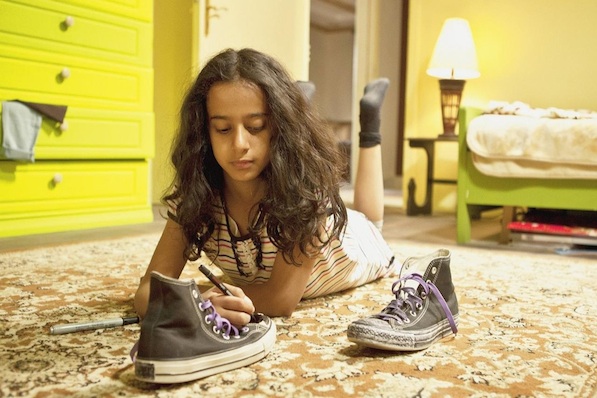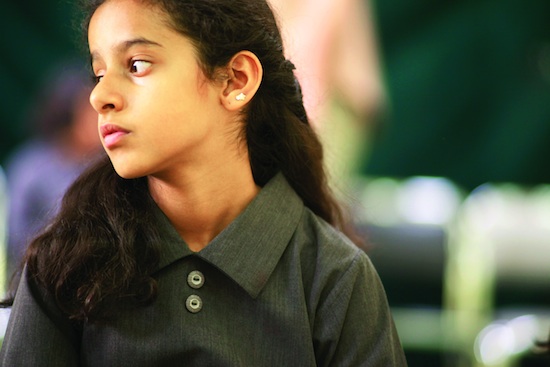Wadjda is the first feature film ever to be shot entirely in Saudi Arabia. It is also the first Saudi feature ever to be directed by a woman. Like her protagonist, a determined eleven-year-old girl saving money to buy herself a shiny new bicycle, Saudi director Haifaa Al Mansour haggled, hustled, and risked her personal safety to make her dream—the completion of this film—come true. Right before her triumphant premieres at Telluride and Venice, the thirty-nine-year-old mother of two spoke from her current home in Bahrain, sharing her thoughts about conservative Islam, the death threats she’s learned to ignore, and the challenges of making her movie in a country that does not permit her to drive a car.
Keyframe: Your star, Waad Muhammad, carries the whole film on her pre-teen shoulders, and we fall in love with her. How did you find this actress?
Haifaa Al-Mansour: We got so lucky. We don’t have casting agencies in Saudi Arabia, and so we just had to get the word out and hope. Of course many parents think it would dishonor a girl to be seen in public, acting in a film. We searched all over the country and met a lot of great candidates, but none were exactly right. And then a week before we were supposed to start production, Waad’s mother brought her in. And the minute we met her, we knew was just something about this little girl… she had a depth and maturity, despite her age.
Her mother is a very conservative and religious woman, by the way, but she knew her daughter wanted to act, so she gave her this chance.
Keyframe: You have received death threats before. Was there concern for Waad’s safety?
Al-Mansour: We were all worried about everyone’s safety, all the time! There were so many times where residents would get angry and want us out of their neighborhood, and they would scream at the actors and crew. The other problem is the religious police doesn’t like artists and freedom of expression, so we would do our best to avoid them and avoid confrontation, even though we had all our permits in place from the government.
And you know, women and men are not permitted to work together, so for all the scenes we shot in public, I had to direct all my actors from inside the van, using a walkie talkie.
Keyframe: So each time you shot a coeducational scene, you were perceived as breaking taboos?
Al-Mansour: We weren’t interested in creating controversy—we just wanted to make our film.
And I tried to stay in the van, but I couldn’t stop myself from jumping out. The driver would shout ‘come back’ but I had to be with my actors!
Keyframe: You’ve always had a professional career, but you started out producing videos for an oil company. When did you make the leap to filmmaking?
Al-Mansour: I had just turned thirty. And I just… you know, being a woman in the middle east, no one really hears you—they jump to the nearest man in the room. People will listen to him instead, regardless of his age, education or experience. You do not feel that you matter. When you speak, even the taxi driver will look at you like ‘what?’
I wanted to have some sort of voice, so I made a short and went to Sundance, and it was accepted, and then it went viral in Saudi. Suddenly people were listening to what I had to say and debating it, and I realized that yes, I can be heard.
Keyframe: As you know, there is a great deal of anti-Arab sentiment in the US. Do you have any fears that Americans will seize on this film as a way of condemning Saudi culture in general?
Al-Mansour: No, at all, I condemn it! The treatment of women is not exactly the strongest point that the Arab culture can defend. They have to change.
Keyframe: How do you hope this film might inspire change?
Al-Mansour: Mobility is a key issue for women in my country, and there are finally real debates about it. But instead of just another intellectual debate about what women should or shouldn’t be permitted to do, we need to just come to see them as people – people who just want a chance to enjoy life.
So I wrote a simple story that could give audiences a chance to see the humanity of this one little girl. All she wants is to ride a bicycle. At the very least, I hope that in the middle east, fathers will see the film and think, ‘Yes, I’m going to buy my daughter a bicycle.’
Keyframe: Will Wadjda screen in Saudia Arabia?
Al-Mansour: There are small cultural venues where some people will probably gather together and see it, probably more amongst intellectuals. But the general public? We simply don’t have theaters. I’m hoping we will have some soon…going to the movies is fun, isn’t it?
And people need an air conditioned theater. This country is very hot, after all.
This article was originally created for the Telluride Film Festival






